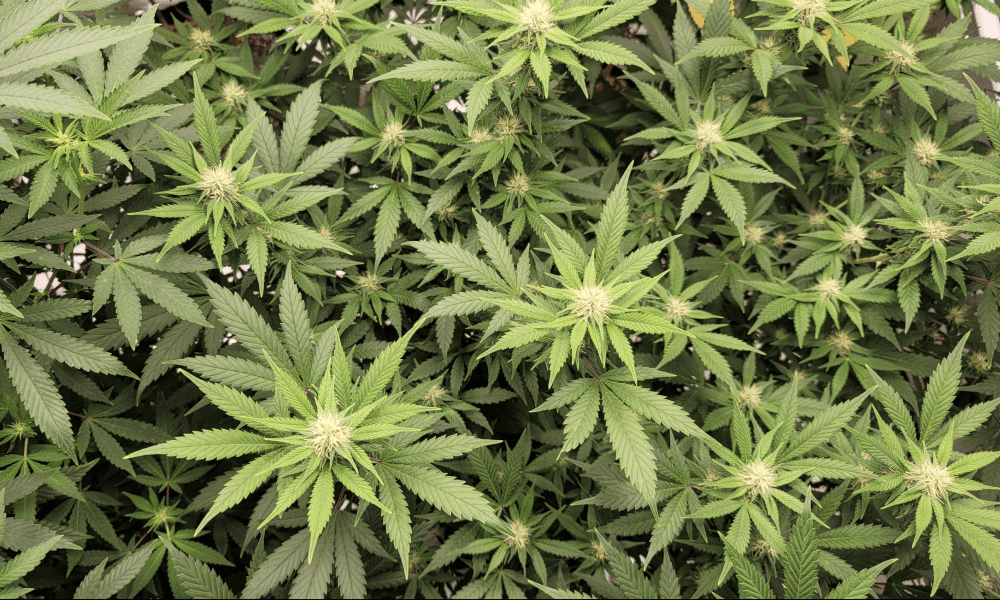featured
Pennsylvania Lawmakers Clash On Competing Marijuana Legalization Proposals As Top GOP Senator Doubts Any Of Them Will Pass This Year
Published
3 weeks agoon

Key Pennsylvania lawmakers are at odds on the path forward for marijuana legalization—while a top Republican senator is dismissing the idea that the reform is achievable at all this session.
Among legalization supporters, the current contention goes back to whether Pennsylvania should take a novel regulatory approach to cannabis with a state-run model, as House Health Committee Chair Dan Frankel (D) is proposing, or create a more conventional private market for adult-use sales.
Frankel—who released a cosponsorship memo for his state-run marijuana proposal late last year alongside Rep. Rick Krajewski (D)—said in an interview with New Castle News that “this will be the bill that we will see,” adding that he’s worked “hand-in-hand” with Democratic leadership.
The measure wouldn’t be exclusively based on a state-run model, however, with a “hybrid” system envisioned that would incorporate private businesses into the cannabis supply chain. But for the sponsors of a separate, bipartisan legalization bill that’s forthcoming, having the state control adult-use marijuana sales is effectively a non-starter.
“There are zero votes for a state-store model in the Republican caucus,” Rep. Abby Major (R) told Axios. Despite the disconnect with Frankel’s comments, the lawmaker said she thinks “we are the closest we have ever been, truly” to legalizing cannabis in the Commonwealth.
Rep. Emily Kinkead (D), the lead Democratic sponsor of the legalization bill alongside Major, gave a more diplomatic response about the state of play, saying that “we need all the options on the table.”
“No one’s bill right now is going to be the final version. The sooner we can get those conversations started, the better,” she said, adding that she and Major “are going to have to move something in May or early June.”
While Democrats control the House and governor’s office, they will still need to reach a deal with the GOP-controlled Senate to effectuate change. And in addition to the conflicting perspectives among pro-legalization legislators, another potential barrier to reform is exactly that political dynamic.
Senate Majority Leader Joe Pittman (R) said that while he sees a “path forward” for enacting regulations for separate gaming-related reform, “I’m not seeing consensus between the four caucuses and the governor collectively that [marijuana legalization] should be a priority.”
Regardless of which direction Pennsylvania lawmakers do—or don’t—go on marijuana legalization session, a survey released last week shows a majority of adults in the state support the reform—and opposition to the policy change has fallen by nearly 50 percent over the last decade.
Kinkead has made the case in another recent interview that legalizing cannabis in Pennsylvania will help the state mitigate public health and safety concerns associated with the illicit market, including the fact that unregulated products can be laced with fentanyl.
The lawmaker previously introduced a separate bipartisan marijuana legalization bill, alongside 15 other cosponsors, last September. It did not advance, however.
Meanwhile, a Republican Pennsylvania senator recently called for the creation of a state “legacy” fund, using tax revenue from adult-use marijuana sales and gaming to make long-term investments in the Commonwealth’s economy.
The senator argued that, beyond using any resulting tax revenue to fund day-to-day projects and public services, the state should earmark a portion of those tax dollars for a fund to “provide a sustainable source of prosperity that lasts for generations.”
Pennsylvania House Speaker Joanna McClinton (D) recently said that Democrats are ready to pass a marijuana legalization bill this session, but that the party “will need Republican support” to get the job done—adding that it will be a “heavy lift.”
Another Democratic lawmaker said legislature is “substantially closer” to reaching a deal on marijuana legalization, and an initial vote on a bipartisan cannabis reform bill could come as early as this month.
Polls have shown bipartisan support for legalization among voters, but the reform has consistently stalled in the legislature, owing in large part to GOP opposition. But not all Republican members are against the policy change—and one recently said she felt her party should seize the “opportunity to snatch” the issue from Democrats.
Krajewski, who is planning to file legalization legislation with Frankel this session, also recently said the policy would provide for “more responsible usage” of cannabis, compared to the status quo that’s left adults either buying from the illicit market or traveling across state lines to get regulated products.
Separately in March, the Pennsylvania House approved a bill sponsored by Frankel that’s meant to strengthen safety standards and oversight of the state’s medical marijuana program as lawmakers work to advance adult-use legalization.
While Pennsylvania’s medical cannabis program was enacted nearly a decade ago, lawmakers say the measure, which now heads to the Senate, is necessary to improve testing compliance, product audits and lab inspections, among other aspects of the industry.
Meanwhile, Pennsylvania Democratic lawmakers recently introduced a bill that would allow farmers and other small agriculture operators to sell marijuana they cultivate to existing growers and and processors if the state moves to legalize adult-use cannabis.
Separately, an independent Pennsylvania agency is projecting more tax dollars to be generated from adult-use marijuana sales compared to what the governor’s office has estimated, although it expects significantly less overall revenue from cannabis legalization due to differing views on licensing fees.
Pennsylvania officials have also launched a new survey that invites legal marijuana businesses across the country to provide information about their operations to help the state better understand the cannabis industry as lawmakers consider enacting adult-use legalization this session.
—
Marijuana Moment is tracking hundreds of cannabis, psychedelics and drug policy bills in state legislatures and Congress this year. Patreon supporters pledging at least $25/month get access to our interactive maps, charts and hearing calendar so they don’t miss any developments.![]()
Learn more about our marijuana bill tracker and become a supporter on Patreon to get access.
—
Also, in a video interview released in March, the governor emphasized that the state is “losing out” to others that have already enacted adult-use legalization, while maintaining a policy that’s enriched the illicit market.
“I think it’s an issue of freedom and liberty. I mean, if folks want to smoke, they should be able to do so in a safe and legal way,” he said. “We should shut down the black market—and, by the way, every state around us is doing it. Pennsylvanians are driving to those other states and paying taxes in those other states.”
Pennsylvania’s Republican attorney general recently said he wants to be a “voice for potential public safety risks” of enacting the governor’s proposal—though he said his office would be ready to enforce the new law if lawmakers did vote to pass it.
The state’s agriculture secretary separately told lawmakers that he’s fully confident that his department is in a “really good” position to oversee an adult-use marijuana program if lawmakers act.
Meanwhile, in February, top Pennsylvania police and health officials told lawmakers they are prepared to implement marijuana legalization if the legislature moves forward with the reform—and that they stand ready to work together as the details of legislation to achieve it are crafted.
Amid the growing calls for marijuana legalization in Pennsylvania, a GOP state senator said prohibition has been a “disaster,” and a regulated sales model for cannabis—similar to how alcohol and tobacco are handled—could serve as an effective alternative.
A Republican Pennsylvania senator also recently defended the push to legalize and regulate marijuana, calling it “the most conservative stance” on the issue.
Separately, a recent poll shows that Pennsylvania voters say they favor a model where cannabis is sold by licensed private businesses, rather than through a system of state-run stores as some legislators have promoted.
Colorado Senate Passes Bill To Let Governor Pardon People For Low-Level Psychedelics Offenses
Photo courtesy of Chris Wallis // Side Pocket Images.

Author: mscannabiz.com
MScannaBIZ for all you Mississippi Cannabis News and Information.
You may like
-


Judge rules Oregon Measure 119 is unconstitutional. Here's why
-


South Africa’s Current Stance On Cannabis
-


Woman allegedly caught with over 150 pounds of cannabis at San Francisco Airport
-


Montana expands marijuana tax use for nature conservation | National
-


One Out Of Four Indian Tribes In The U.S. Is Now Involved In Marijuana Or Hemp Programs, New Map Shows
-


Minnesota lawmakers propose increased tax hike on cannabis products, 5% more than the currant rate

The country is one of the powerhouses on the continent, but is South Africa’s current stance on cannabis?
The country and their leadership is in the news, but what is South Africa’s crest stance on cannabis? The country is undergoing a significant shift in its relationship with cannabis, a plant long entwined with its cultural and economic history. Known locally as “dagga,” cannabis has been used for generations across rural communities for medicinal, recreational, and spiritual purposes. Today, evolving legislation, court rulings, and commercial interests are reshaping how the country views and engages with this controversial crop.
RELATED: Mixed Messages From The Feds About Cannabis
The landmark moment came in September 2018, when the Constitutional Court decriminalized the private use and cultivation of cannabis for adults. This unanimous ruling declared that laws prohibiting personal use infringed on the right to privacy, effectively making it legal for individuals to grow and consume cannabis in private spaces. However, the sale and public consumption of cannabis remain illegal under national law, creating a legal grey area that continues to be debated.

In 2024, the South African Parliament passed the Cannabis for Private Purposes Bill, providing clearer guidelines on personal use, possession limits, and cultivation rules. Yet, critics argue the bill does not go far enough in addressing the commercial potential of cannabis or in rectifying the harms of prohibition, particularly among marginalized communities disproportionately affected by past enforcement.
Economically, the potential for a legal cannabis industry in South Africa is substantial. With favorable growing conditions, experienced cultivators, and high-quality strains, the country is well-positioned to become a global player in medical cannabis exports. Several licensed producers have already begun exporting cannabis products to Europe and other regions. The industry has the potential to create thousands of jobs, particularly in rural areas where unemployment is high.
RELATED: Cannabis Is Way Better And Safer Than A Honey Pack
Yet, significant challenges remain. Regulatory uncertainty, bureaucratic delays, and limited access to capital have hindered the sector’s growth. Traditional growers—many of whom have operated informally for decades—often find themselves excluded from the legal market due to complex licensing requirements and high entry costs.
There is also a broader social conversation underway. Advocates are pushing for policies that support restorative justice, equitable participation in the cannabis economy, and public education about responsible use. As South Africa navigates this evolving terrain, it faces the dual challenge of crafting laws that respect constitutional rights while unlocking the economic and medicinal potential of cannabis in a way that is inclusive and sustainable.

Author: mscannabiz.com
MScannaBIZ for all you Mississippi Cannabis News and Information.
featured
One Out Of Four Indian Tribes In The U.S. Is Now Involved In Marijuana Or Hemp Programs, New Map Shows
Published
4 hours agoon
May 21, 2025
A new infographic from an advocacy group representing Native American tribes in the legal cannabis industry shows that more than a fourth of Indigenous communities in the continental United States are now involved with marijuana or hemp programs.
The map, created by the Indigenous Cannabis Industry Association (ICIA) in collaboration with the law firm Vicente, shows the locations of more than 100 tribal marijuana and hemp programs across the country.
Overall, approximately 26 percent of the 358 federally recognized Indigenous communities in the continental U.S. are now involved in some sort of cannabis program, the groups said.
The data, they said in a press release, “shows that the Indigenous cannabis industry is trending upward in terms of jobs, community development, and overall industry growth, with many Tribes currently scaling to meet demands for global cannabis distribution.”
“Since the first regulated Indigenous cannabis storefront opened almost 10 years ago in Washington State,” the groups said, “dozens of sovereign Indigenous communities have created their own unique regulatory systems to govern cannabis cultivation, production and sales.”

Indigenous Cannabis Industry Association
The map shows both individual programs as well as clusters that “denote tribal and Indigenous-led enterprises that are already working together to create successful supply chains and distribution networks.”
“Indigenous cannabis programs are a vital piece of America’s cannabis movement,” Andrew Livingston, Vicente’s director of economics and market analysis, said in a statement. “And these businesses deserve recognition. The goal of our study is to provide information on how different Indigenous communities have established their regulated cannabis programs, the size of the economic opportunity, and the ways that regulating cannabis can be structured in the future to further the goals of each community.”
In North Carolina, for example, a single, isolated dot represents the legal marijuana market recently launched by the Eastern Band of Cherokee Indians, which now serves both tribal members and adult visitors alike. That’s despite marijuana still being prohibited in North Carolina itself, whether for medical or adult use.
It’s believed that in 2020, the Oglala Sioux Tribe, located in South Dakota, became the first tribe to vote to legalize marijuana within a U.S. state where the plant remained illegal.
In other states, meanwhile, including Minnesota, Oklahoma and much of the American West, the map is peppered with multiple tribal programs. Many of those states, notably Minnesota, have worked with Indigenous communities to incorporate tribal-run businesses into state-legal marijuana markets.
Minnesota’s 2023 cannabis law allowed tribes within the state to open marijuana businesses before the state itself began licensing retailers. Some tribal governments—including the Red Lake Band of Chippewa Indians, the White Earth Nation and the Leech Lake Band of Ojibwe—entered the legal market early on.
Rob Pero, ICIA’s founder, said the joint research project between his organization and Vicente “will highlight the thoughtful work that has gone into these sovereign regulatory programs as well as how these businesses affect local employment and revenue for community services.”
“Together, we hope to inform, inspire and empower other Indigenous communities considering cannabis as well as policy makers around the world,” he said.
Indigenous-Led Campaign Aims To Legalize Medical Marijuana In Wisconsin
Photo courtesy of Mike Latimer.

Author: mscannabiz.com
MScannaBIZ for all you Mississippi Cannabis News and Information.
featured
Marijuana And Alcohol Businesses Should Join The Hemp Industry In The Fight For Regulation Instead Of Prohibition (Op-Ed)
Published
5 hours agoon
May 21, 2025
“We humbly ask our new friends in the alcohol and marijuana industries to join us. Reject misguided bans while embracing robust regulation.”
By Jonathan Miller, U.S. Hemp Roundtable
In recent months, leading organizations and companies in the alcohol and marijuana space have jumped into the hemp sector, offering their support for clear federal legalization and robust oversight of hemp products.
The U.S. Hemp Roundtable, the hemp industry’s national advocacy organization, welcomes them—but asks them to join us in a framework that rejects prohibition, embraces regulation, prevents access by minors and protects retail and e-commerce for all elements of the diverse hemp industry.
Since the 2018 Farm Bill federally legalized hemp, it’s been a rollercoaster ride. After a brief gold rush, the Food and Drug Administration’s (FDA) refusal to regulate CBD led to a crash in prices and widespread disruption. But with a hemp industry as resilient as its stalk, innovators pioneered direct-to-consumer (DTC) sales and developed a new market for adult health and wellness products–including a hemp beverage boom which now meets growing demand for non-alcoholic options.
Today, the hemp extract market has surged to $28.4 billion, creating 328,000 agriculture and retail jobs, with a $13.2 billion employment impact and $1.5 billion generated in state tax revenues. Its popularity is not surprising—hemp products are made in the USA, harvested from crops grown by American farmers, manufactured by innovative U.S. entrepreneurs and sold by small businesses dotting the nation.
Competing interests have taken note of hemp’s success. A few marijuana multi-state operators (MSOs) have led efforts at the state and federal level to ban hemp products, and/or seek monopoly control over distribution. But the majority of marijuana advocates support regulation, not prohibition. In fact, many cannabis companies have found new life via hemp. We’re excited to join an emerging new effort to bring the entire cannabis family together in a united policy-making venture.
More recently, the alcohol industry is weighing in as hemp beverages have gained space on shelves previously reserved for liquor. Leading organizations such as the Wine & Spirits Wholesalers of America and the American Beverage Licensees have called for Congress and state legislators to explicitly legalize and regulate hemp beverages, which in 2024 boasted $380 million in revenues.
But warning clouds loom. In some states, efforts to regulate beverages include bans on other types of hemp products, such as edibles or CBD tinctures fully 85 percent of the hemp product marketplace). In others, there is a rush to ban DTC sales—a lifeline to hundreds of thousands of adult consumers.
Texas has emerged as a key battleground. In response to Lt. Gov. Dan Patrick’s (R) crusade to criminalize all hemp products, HB 28 was introduced as a hemp beverage carveout. Unfortunately, that bill would ban nearly all non-beverage hemp products, criminalize DTC and dramatically reduce the number of retailers who can sell these products.
More regulation of hemp products is certainly needed. A lack of uniform quality control standards for hemp products at the federal level has forced responsible farmers and small business owners to compete against unscrupulous actors, who generate headlines by distributing poorly manufactured products that are sometimes inappropriately marketed to children.
To solve this problem, the U.S. Hemp Roundtable and dozens of hemp industry groups have united behind an appropriate response: robust regulation, not prohibition. We support an approach that ensures products are manufactured safely, marketed transparently and kept far out of the hands of children. We’ve even taken the additional step of establishing the U.S. Hemp Authority, the industry’s self-regulating organization, with rigorous standards for safety, quality and transparency.
At the federal level, we are hopeful that new leadership at FDA will reverse the past course of inaction and take deliberate steps to regulate hemp products. This approach is precisely in line with the new administration’s focus on providing adult consumers the freedom to make health care choices on behalf of their own families.
If laws must be changed, we urge Congress to act now. Sen. Ron Wyden’s (D-OR) effort in the last Congress, S. 5243, would require FDA to regulate hemp products. A parallel effort would invest more authority in the states to properly regulate their own markets.
We humbly ask our new friends in the alcohol and marijuana industries to join us. Reject misguided bans while embracing robust regulation. Preserve critical DTC channels, while ensuring aggressive steps are taken to protect against sales to minors. Treat all product forms equitably, allowing adult customers access to the products they prefer.
Hemp is a uniquely American success story. This is a plant that feeds, heals and sustains. Its cannabinoids offer wellness solutions for some of the most vulnerable members of our society. Its seeds are rich in protein and nutrients. Its fiber is transforming construction, textiles, packaging and plastic alternatives. Hemp’s contributions to health, sustainability and economic development are real and lasting.
We invite all stakeholders to work together toward common-sense, evidence-based regulation that protects consumers, prevents underage access and supports innovation.
Jonathan Miller is the general counsel of the U.S. Hemp Roundtable, the hemp industry’s national advocacy organization.
Photo courtesy of Brendan Cleak.

Author: mscannabiz.com
MScannaBIZ for all you Mississippi Cannabis News and Information.

Judge rules Oregon Measure 119 is unconstitutional. Here's why

South Africa’s Current Stance On Cannabis

Woman allegedly caught with over 150 pounds of cannabis at San Francisco Airport

Montana expands marijuana tax use for nature conservation | National

One Out Of Four Indian Tribes In The U.S. Is Now Involved In Marijuana Or Hemp Programs, New Map Shows

Minnesota lawmakers propose increased tax hike on cannabis products, 5% more than the currant rate

Marijuana And Alcohol Businesses Should Join The Hemp Industry In The Fight For Regulation Instead Of Prohibition (Op-Ed)

Video shows drug-smuggling cat caught by prison guards in Costa Rica

Marijuana Rescheduling Blocked By Opposition ‘From Within’ DEA, Biden’s Drug Czar Says

Celebrity-owned pot shop in Los Angeles burglarized

California Seizes $123.5M of Illicit Cannabis in Largest Task Force Operation Yet

Ohioans spent nearly $80M on cannabis last month, with clear product preferences

Marijuana Banking Amendment Could Be Added To Cryptocurrency Bill In Senate This Week, Opposition Group Warns

Ohioans spent nearly $80 million on cannabis last month, with clear product preferences

Jeff Adams & Joseph Bancheri: Decontaminating Cannabis with X-Ray Technology

White Earth allowed to sell cannabis off reservation

Minnesota Signs First-Of-Its-Kind Agreement Allowing Indian Tribe To Sell Legal Marijuana Outside Reservation

My fight to unlock cannabis and psychedelic drugs for use in medical research

Federal Judge Blocks Voter-Approved Oregon Law Requiring Marijuana Businesses To Have Labor Peace Agreements With Workers

A journey through landrace cannabis in LA: From Mendocino to WeHo

Native American Tribes Find Economic Power In Alcohol, Cannabis And More

Study: Musculoskeletal Pain Patients Experience Symptom Improvements, Minimal Side Effects Following Sustained Use of Cannabis

Woman tried to smuggle 150 lbs of cannabis from SFO to Germany: DA

American Basketball Player Arrested in Indonesia for Cannabis Could Face Death Penalty

Connecticut Appoints The US’s First Cannabis Ombudsperson – Yes there is a pun in there and I’m Sure Erin Kirk Is Going To Hear It More Than Once!

5 best CBD creams of 2024 by Leafly

Free delta-9 gummies from Bay Smokes

Mississippi city official pleads guilty to selling fake CBD products
New Study Analyzes the Effects of THCV, CBD on Weight Loss

May 2024 Leafly HighLight: Pink Runtz strain

Curaleaf Start Process Of Getting Their Claws Into The UK’s National Health System – With Former MP (Resigned Today 30/5/24) As The Front Man

EU initiative begins bid to open access to psychedelic therapies

Alert: Department of Cannabis Control updates data dashboards with full data for 2023

Horn Lake denies cannabis dispensary request to allow sale of drug paraphernalia and Sunday sales | News

Press Release: CANNRA Calls for Farm Bill to Clarify Existing State Authority to Regulate Hemp Products

Nevada CCB to Accept Applications for Cannabis Establishments in White Pine County – “Only one cultivation and one production license will be awarded in White Pine County”

5 best autoflower seed banks of 2024 by Leafly

Discover New York’s dankest cannabis brands [September 2024]

Local medical cannabis dispensary reacts to MSDH pulling Rapid Analytics License – WLBT

6 best CBD gummies of 2024 by Leafly

5 best THC drinks of 2024 by Leafly

People In This State Googled ‘Medical Marijuana’ The Most, Study Shows

The Daily Hit: October 2, 2024

Weekly Update: Monday, May 13, 2024 including, New Guide for Renewals & May Board meeting application deadline

5 best delta-9 THC gummies of 2024 by Leafly

Press Release: May 9, STIIIZY and Healing Urban Barrios hosted an Expungement Clinic & Second Chance Resource Fair

PRESS RELEASE : Justice Department Submits Proposed Regulation to Reschedule Marijuana

Thailand: Pro-cannabis advocates rally ahead of the government’s plan to recriminalize the plant
Trending
-

 Breaking News12 months ago
Breaking News12 months agoConnecticut Appoints The US’s First Cannabis Ombudsperson – Yes there is a pun in there and I’m Sure Erin Kirk Is Going To Hear It More Than Once!
-

 best list10 months ago
best list10 months ago5 best CBD creams of 2024 by Leafly
-

 Bay Smokes11 months ago
Bay Smokes11 months agoFree delta-9 gummies from Bay Smokes
-

 Mississippi Cannabis News1 year ago
Mississippi Cannabis News1 year agoMississippi city official pleads guilty to selling fake CBD products
-

 cbd1 year ago
cbd1 year agoNew Study Analyzes the Effects of THCV, CBD on Weight Loss
-

 California1 year ago
California1 year agoMay 2024 Leafly HighLight: Pink Runtz strain
-

 Breaking News12 months ago
Breaking News12 months agoCuraleaf Start Process Of Getting Their Claws Into The UK’s National Health System – With Former MP (Resigned Today 30/5/24) As The Front Man
-

 Business8 months ago
Business8 months agoEU initiative begins bid to open access to psychedelic therapies

